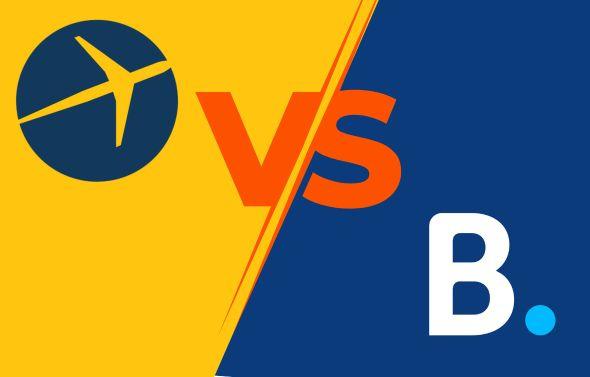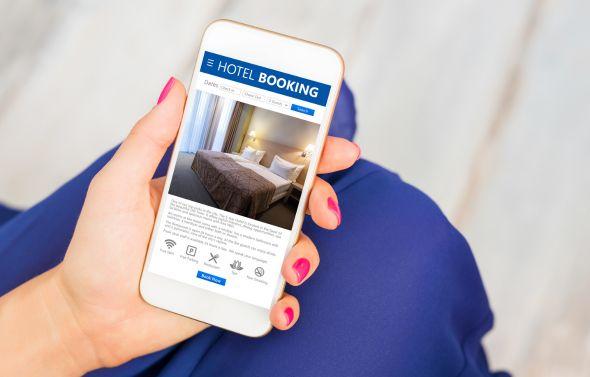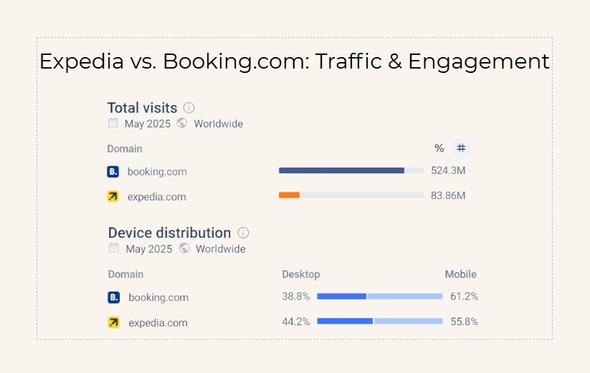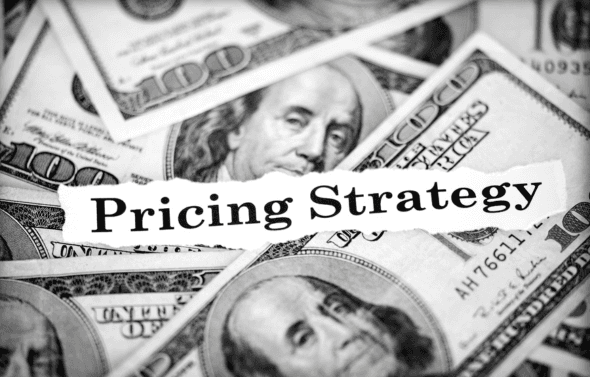Expedia vs. Booking.com: Which Booking Site Works Better for Hosts

When it comes to maximizing your short-term rental income, choosing the right booking site isn't just a marketing decision, it’s a business one. Expedia and Booking.com both promise reach, visibility and more guests. But which platform actually delivers for hosts?
With dozens of online booking platforms out there, most property managers eventually find themselves comparing these two booking giants. Whether you're listing a few units or managing an entire portfolio, knowing how Expedia vs Booking.com stack up can help you reach more customers, secure a better price and simplify your reservation process.
This article breaks down what every host needs to know about these two online travel agencies — from commission fees to guest behavior to integration with your hotel management tools. By the end, you’ll be able to choose the best booking site for your business goals and make data-driven decisions that drive bookings and revenue.

What Expedia and Booking.com Have in Common
While there are key differences between Expedia and Booking.com, both platforms share several core features that make them popular with hosts and travelers alike. As two of the world’s largest online travel agencies, these booking sites help property managers tap into massive global audiences, streamline processes and fill calendars faster.
Here’s what both platforms offer:
Global reach: Both companies operate in over 70 countries and attract a large number of travelers from around the world.
Diverse property types: You can list a wide variety of accommodation options, including hotels, motels, vacation homes, cabins and unique stays like treehouses or boats.
Guest support and reviews: Each platform handles reservation processing, guest communications and review collection, so you can focus on managing your property.
Host-facing tools: Both offer marketing tools, reporting dashboards and calendar sync to help hosts manage availability and compare prices across platforms.
Commission-based revenue model: Neither platform charges an upfront listing fee — instead, hosts pay commission fees based on completed bookings.
While these similarities make both OTAs strong options, the differences in exposure, pricing control, and guest types can significantly impact your business results. Let’s take a closer look at where these two platforms diverge and how that affects your bottom line.

Key Differences Between Expedia and Booking.com
Although Expedia and Booking.com share the same goal — connecting hosts with more customers — how they get there varies in ways that can impact your revenue, visibility and day-to-day operations. From fee structures to guest demographics to platform tools, each of these two platforms takes a different approach to supporting short-term rental businesses.
Understanding these differences can help you decide which booking site aligns better with your property’s needs, your pricing strategy and your long-term business goals.
Category | Expedia | Booking.com |
Global presence | Operates globally through 200+ travel sites in over 70 countries | Available in 220+ countries and territories |
Number of listings | 3+ million accommodation listings | Over 28 million listings, including 6.6 million vacation rentals |
Property types | Supports hotels, motels, resorts and a variety of short-term rentals: condos, cabins, villas, chalets, treehouses and more | Offers listings for hotels, apartments, vacation rentals, tiny houses, boats, serviced apartments and other alternative stays |
Target audience | Appeals to families, business travelers and budget-conscious guests looking for great discounts and vacation packages | Focuses on leisure travelers, families and business professionals |
Service fees | Commission fees range from 10% to 30%, depending on location, listing type and other factors | Commission fees generally range from 10% to 25%, based on property type, location and participation in marketing programs |
Host benefits | Listings appear across Expedia Group brands (e.g. Vrbo, Hotels.com); access to tools for performance tracking, data and rate management | Hosts use the Pulse app to manage listings; optional marketing tools like Visibility Booster; liability coverage up to $1M per reservation |

Expedia vs. Booking.com: Property Types
Both Expedia and Booking.com support a wide variety of accommodation types, giving hosts the flexibility to list everything from traditional hotels and motels to more unique vacation rentals. This variety helps attract a broad range of guests and ensures visibility across different traveler preferences and budgets.
Expedia offers access to over 3 million properties, including resorts, boutique hotels and short-term rentals. Hosts can list vacation homes, cottages, cabins, villas, chalets, farm stays and even treehouses and glamping-style accommodations.
Booking.com’s inventory is even larger, with more than 28 million listings, including over 6.6 million homes, apartments and other alternative stays. Hosts can feature everything from tiny houses and boats to serviced apartments, ryokans, country houses and luxury tents.
For short-term rental operators, this means both platforms can support your listing — no matter how standard or specialized it is. But depending on your property type and location, one OTA may deliver stronger visibility or attract better-matched guests than the other.

Expedia vs. Booking.com: How the Booking Process Works
Listing your property on Expedia
To list your property on Expedia, you’ll go through Expedia Partner Central, the platform’s dedicated portal for property owners. From there, you can manage your listing, update your calendar and rates, communicate with guests and access performance tools like competitive pricing analysis and local market insights. These services are designed to help you make data-informed decisions and stay competitive.
When setting up your listing, you’ll be asked to choose between a hotel/lodging category or a private residence. If you select Private Residence, Expedia will redirect you to Vrbo, another brand within Expedia Group. Once your Vrbo listing is live, and if Instant Booking is enabled, it will also appear on Expedia.com and affiliated booking sites, giving your property greater visibility without requiring separate accounts.
Listing your property on Booking.com
Booking.com allows property owners to create listings for free and access a massive global audience of travelers. Hosts manage their listings through the Booking.com Extranet, a backend dashboard that supports everything from pricing updates to guest messaging. The platform also offers the Pulse mobile app, which lets you handle reservations and communicate with guests while on the go.
Hosts looking to improve listing performance can opt into paid tools like Visibility Booster, which helps increase exposure in search results. Additionally, Booking.com provides up to $1 million in liability coverage per reservation, offering peace of mind in case of guest-related issues.

Expedia vs. Booking.com: Guest Quality and Host Experience
Not all guests are the same, and depending on the platform, you may attract different traveler types with very different expectations. Understanding the typical booking behavior on Expedia vs. Booking.com can help you prepare your property, set the right policies and manage your time and resources more effectively.
Guest types and travel habits
Expedia often attracts travelers planning full-service trips. These are guests who book vacation packages and may expect resort-style accommodation, add-ons like car rentals or hotel-like amenities. If you're running a destination property — like a beach house or mountain cabin — Expedia may bring in longer stays and more hands-off guests.
Booking.com tends to attract a broader range of guests — from solo business travelers and couples to families and budget-conscious tourists. These guests are often booking short city stays and may be more price-sensitive or focused on location and convenience.
Expectations around amenities and services
While short-term rentals don’t offer traditional hotel services, some guests — especially those coming from platforms like Booking.com — may expect hotel-like touches such as a front desk, 24/7 support or even complimentary breakfast (especially if your property is listed alongside hotels or motels). Managing expectations clearly in your listing description is key.
Host experience and operational demands
Hosts may find that Expedia guests are more likely to book in advance and stay longer, reducing turnover and increasing revenue per stay.
Booking.com users may book last-minute and stay for fewer nights, which can mean more frequent cleaning and communication but also a steady flow of reservations.
Both platforms support reviews and guest ratings, but Booking.com has a more structured post-stay review process.

Expedia vs. Booking.com: Which Platform Brings in More Customers?
When it comes to getting more customers through your digital front door, visibility is everything. Both Expedia and Booking.com attract millions of users each month, but their reach, audience types and listing algorithms work a bit differently and that can affect how easily guests find your property.
Market reach and website traffic
Booking.com leads in global website traffic, especially across Europe and Asia, making it a strong choice for urban rentals and international guests. Expedia has a stronger foothold in North America, attracting U.S.-based customers who often book bundled vacation packages, car rentals and hotels.
Audience profiles and booking behavior
Expedia draws leisure travelers planning full-service trips — ideal for resort-style or destination properties. Booking.com appeals to more customers across all travel types, including business travelers, families and city visitors.
Listing visibility and search filters
Both sites use ranking systems and tools to increase listing exposure — such as Booking.com’s Visibility Booster and Expedia’s dynamic positioning. Completing your listing, using competitive pricing and optimizing for mobile access can help you get in front of the right users.

Expedia vs. Booking.com: Commission Fees and Revenue Impact
Both Expedia and Booking.com operate on a commission-based model, meaning hosts pay a fee for each confirmed reservation. However, the commission fees vary depending on the platform, property type and location.
Expedia Commission Fees
Expedia typically charges hosts between 10% and 30% per booking, with the average rate for hotels hovering around 20%. The exact percentage depends on your location, accommodation type and how competitive your listing is within the booking site.
Because Expedia Group includes multiple brands, the fee structure can vary. For example, Vrbo, which handles vacation rentals, charges an 8% fee per booking — split into a 5% commission fee and a 3% payment processing fee.
Booking.com Commission Fees
Booking.com also charges commission fees on each booking, typically ranging from 10% to 25%. The average rate is around 15%, though this can fluctuate based on your property's performance, location and participation in marketing programs. The fee is calculated on the booking subtotal, excluding taxes and additional charges.
Maximizing Revenue as a Host
While listing on these platforms gives you access to a global audience of potential guests, the cost of services can add up quickly. To keep more of your money, many hosts also invest in a direct booking website and encourage repeat stays by building stronger guest relationships.

Expedia vs. Booking.com: Pricing Control and Strategy
Setting the right prices is one of the most powerful levers a host can pull — but the flexibility each platform gives you can affect visibility, profitability and guest conversion.
Can you offer a cheaper rate?
Yes, you can offer a cheaper rate on one platform, but both OTAs prefer same price parity across channels. Undercutting may hurt your visibility or even violate terms. Still, some hosts test different rates to compare prices and optimize for better rates over time.
Are Prices Dynamic or Fixed?
Both platforms support dynamic pricing — manually or through third-party tools. Expedia offers built-in analytics and access to market rate comparisons. Booking.com allows rate automation through its Extranet and encourages the use of smart pricing tools to remain competitive.
Dynamic pricing means you can aim for better rates, avoid leaving money on the table and stay ahead of local trends — without having to make daily manual changes.
Do They Support Promotions, Discounts and Deals?
Yes, both platforms actively promote deals to attract more guests.
Booking.com has built-in discount features like Genius loyalty discounts, early bird specials and last-minute deals. You can also create custom promotions inside the Extranet.
Expedia allows hosts to offer great deals through limited-time discounts, member-only pricing through loyalty programs and bundled vacation packages. Hosts using Vrbo can run seasonal or repeat guest discounts as well.

Expedia vs. Booking.com: Which Platform Works Best for Your Business?
At the end of the day, both Expedia and Booking.com offer powerful tools to help hosts grow their short-term rental business, but they do it in slightly different ways.
If your property is in a resort destination and you want access to bundled vacation packages and longer-stay guests, Expedia (especially through Vrbo) may be the better fit. On the other hand, if you manage urban listings and want steady reservations from international travelers, Booking.com might deliver more customers more consistently.
The smartest hosts don’t rely on just one platform — they diversify their listings and streamline their operations with all-in-one software solutions like Hostaway.
Hostaway integrates seamlessly with both Expedia and Booking.com (plus dozens of other OTAs), giving you a single dashboard to manage pricing, availability, reservations and guest communication across every channel.
To increase bookings and save time request a free demo today and see how easy it is to scale your short-term rental business — smarter, faster and with full control.
Ready to find out how Hostaway can transform your business?
